What helps you find your zen? How do you get "in the zone"?
For me, it's sitting on my balcony on a warm, sunny day doing some writing or getting through a backlog of emails. The contrast of nature and technology relaxes me in a way that's hard to explain.
But the important thing is that I know it helps, which is why when I'm not on Zoom calls or the weather is uncooperative, I'm reminding myself to get outside!
Find your spot and you may be surprised how it can help your mood and boost your focus.
In today’s edition, we look at how you can generate more good ideas with your team, break down a giant study about offices and the impact hybrid work has had, and we let you know about a special opportunity coming very soon.
Let’s dive in…
Table of contents:
- 🥘 Food for Thought on the Power of Idea Labs
- 📰 News & Reports for Managers on Takeaways from a Study on Office Space in 2024
- 🗣️ Coming soon: A way to Improve your Relationship with your Boss
Note: This is a preview of our weekly leadership newsletter, Lighthouse Leadership Weekly (LLW).To get this sent to your inbox every week, along with our latest long form essays on this blog, you can sign up here.
🥘 Food for Thought
"An idea lab to me is when a group of people, whether it's two or a thousand, with a culture in which it is cool to think independently and say what you're really thinking.
[It] inherently is going to be full of disagreements because we all have different pasts, we have different personalities, different life philosophies, different observations.
Inherently, people are going to have all kinds of different views, but they connect their brains together like neurons and that can form this larger brain, it makes everyone smarter." - Tobi Lutke, CEO of Shopify
I love this discussion between Tobi Lutke (Shopify CEO) and Tim Urban (Wait but Why) on Shopify's internal podcast:
One of the most fun things I get to do is host amazing people in our Shopify internal podcast (called Context).
— tobi lutke (@tobi) April 2, 2024
What do we talk about? Things like this with @waitbutwhy. pic.twitter.com/r5P5iIZbKd
It's a great reminder to think about the culture you're creating.
To really understand your culture from this perspective, ask yourself:
- Is your company an Idea Lab 💡 or a conformist culture 🇨🇳?
- Is it safe to disagree? 🙅
- Are creative ideas explored or quickly dismissed? 🎨
- How is failure treated? 📉
- What do you celebrate? 🎉
Let's look more closely at each of those, because as you may have learned over the years, what leaders say and think can be very different from reality.
- Is your team conformist? Diversity of ideas is the key to innovation. How you get that can vary, but if you find your team tends to wait to hear what you or someone vocal says and everyone quickly agrees, you're conformist.
- Is it safe to disagree? How do you and your team react if someone pushes back on a suggestion, or offers an alternate perspective? Watch this especially with new hires, as disagreeing often gets quickly stamped out when someone joins and learns what's actually okay.
- Are creative ideas explored? When your team member has a suggestion, do you immediately say, "That'll never work." or do you ask, "What would have to be true for that to work?" You'll get totally different responses and outcomes depending on which you say.
- How is failure treated? Innovation is risky. Is it safe to try things, or does failure lead to punishment, reduced roles or budgets, and discounting future ideas. It's hard to take risks, especially with careers, bonuses, and recognition on the line. People won't take real risks if they know failure is treated harshly.
- What do you celebrate? As we talk about it often: What you praise and recognize you get more of. Do you thank or praise people for sharing interesting ideas? Do bold bets get support, or concern? Is failure a blame game, or do you look for the silver lining of what was learned and encourage your team to try again?
You have the power to define the culture on your team by your actions and what you reward.
It's worth reflecting this weekend: What do your *actions* say about independent thinking and supporting innovation?
📰 News & Reports for Managers
📌 What does a study of office space tell us about modern workplaces in a world of hybrid and remote teams?
I always keep an eye out for interesting studies to review and share with you, and this time a study from real estate titan CBRE (Caldwell Banker Richard Ellis), has some interesting findings. (See the full study here).
Here's a few of the key takeaways:
- "While 45% of participants have policies requiring employees be in the office three or more days per week, less than 4% consistently implement consequences for not following policy."
- Office space use is still wayyy down from pre-pandemic numbers: "utilization rates, which measure the actual use of space, remain under 40%, a 45% decrease from the pre-pandemic global average of 64%."
- Hybrid work seems to be here to stay: 90%of workplace policies offered a hybrid program, an 8% increase from 83% in 2021.
- Only 19% of participants claim to have successful hybrid programs where employee behaviors and leadership expectations align.
- 89% of these "successful hybrid organizations" offer remote work 1-2 days per week.
Going along with those written highlights, here are some of the most interesting charts:
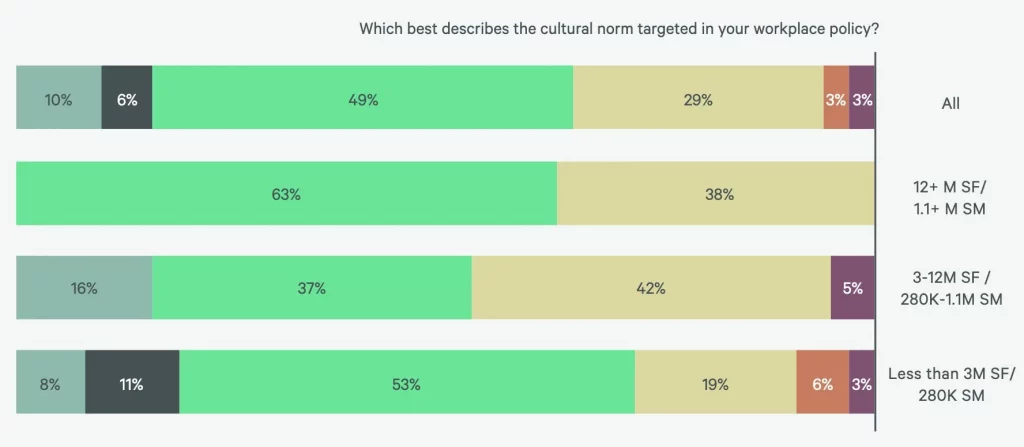
In the real estate world, they measure by the amount of square footage a company has. For our purposes, we can use that as a proxy for company size, where the more square footage (SF), the larger the company.
What we can see here is that the largest companies have the most "in office 3+ days" and "Equal mix office/remote", while the smallest size has the greatest diversity of approaches. This seems to show that as your company grows it is somewhat easier to have a standard policy, though as we learned earlier, only 4% of companies have enforcement of these rules.
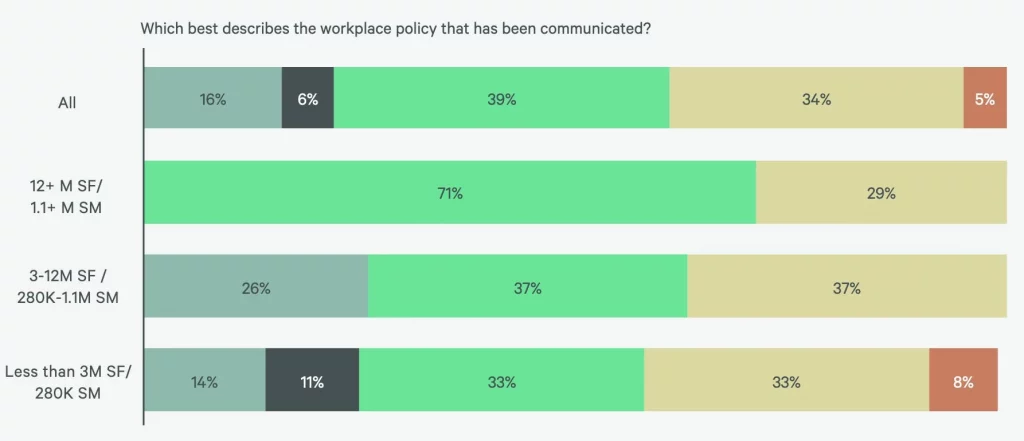
As we learn often, what a leader says and what a team does can often be two very different things. As we can see in the second half of this chart from the CBRE report, what was communicated tends to be a bit different than reality:
- The cultural norm of having no policy is noticeably lower than the communicated amount for the small and medium size offices (14% vs. 8% and 26% vs 16% respectively).
- For the smallest office spaces reported, the 3+ days a week setup is significantly greater than what was communicated (53% vs. 33%), largely at the expense of an "equal mix", which makes sense; it's not that big a difference, but if you start to have a culture of coming into the office, it's easy for half time to become 3+ days.
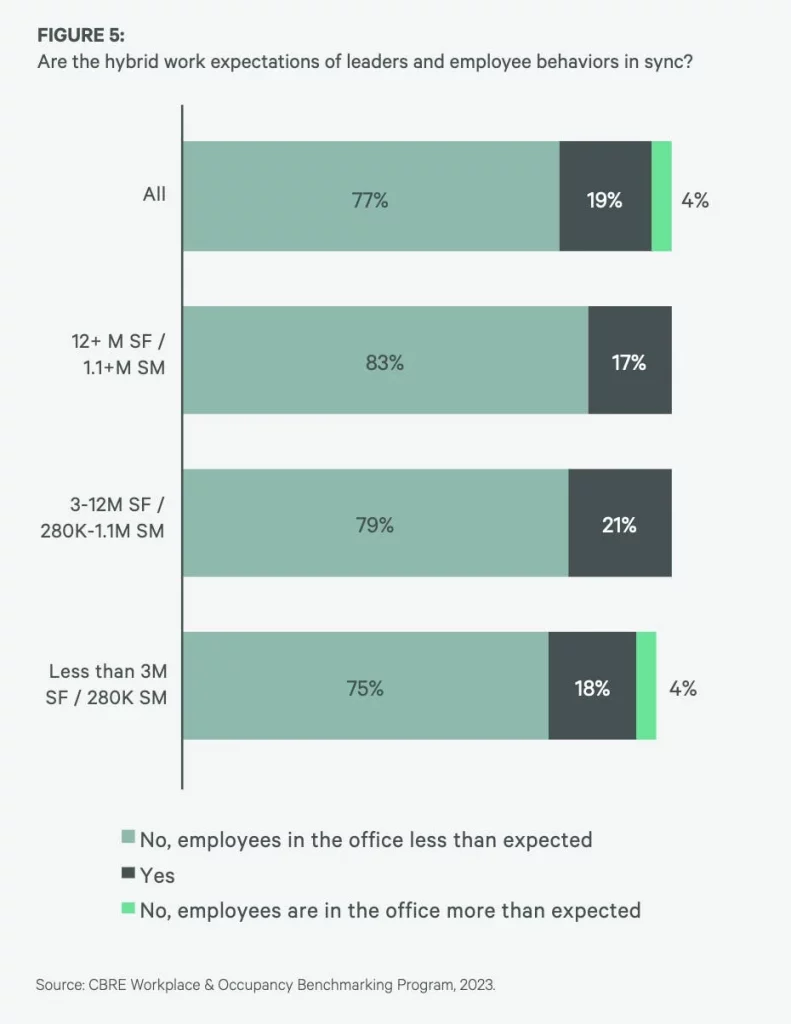
As you can see, across all sizes, everyone is underwhelmed by how much people are actually in the office, as in all cases 75%+ are seeing employees in the office less than expected.
Knowing all of this, how can you convince your team to want to be in the office more?

As you can see, there's a steep drop off after the top two reasons:
- Team connection and community
- Collaborate face-to-face
That means if you want to get more people to come into your office, these are the things to emphasize with them. Do things like:
- Organize a team event that gives people a reason to be in the office
- Plan collaboration for key planning, brainstorming, and other meetings and request everyone be in person for it.
- Fly in a distantly remote team member, and use that as an excuse to ask your whole team to come in more during that week (or whatever time period they're visiting).
- Look for rituals and fun habits you can add to certain meetings that would make people want to be in person for them (like Mark Crowley's giving out candy reward, or something you do in the meeting).
And of course, remember this is a two-way street:
- If people have a specific request to avoid a conflict for them, try to be reasonable.
- Don't ask people to be in the office just for the sake of being there.
- Listen to your team for feedback and ideas. They likely know best what will get them to want to come in more often.
And if you want a few more ideas, here's what employees tend to think are good, and not so good, reasons to come into the office:
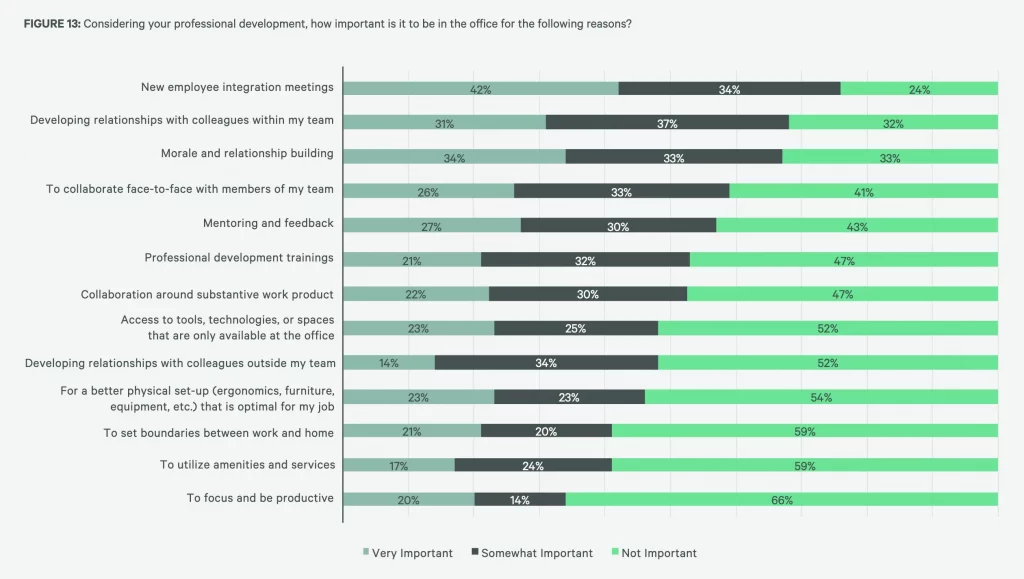
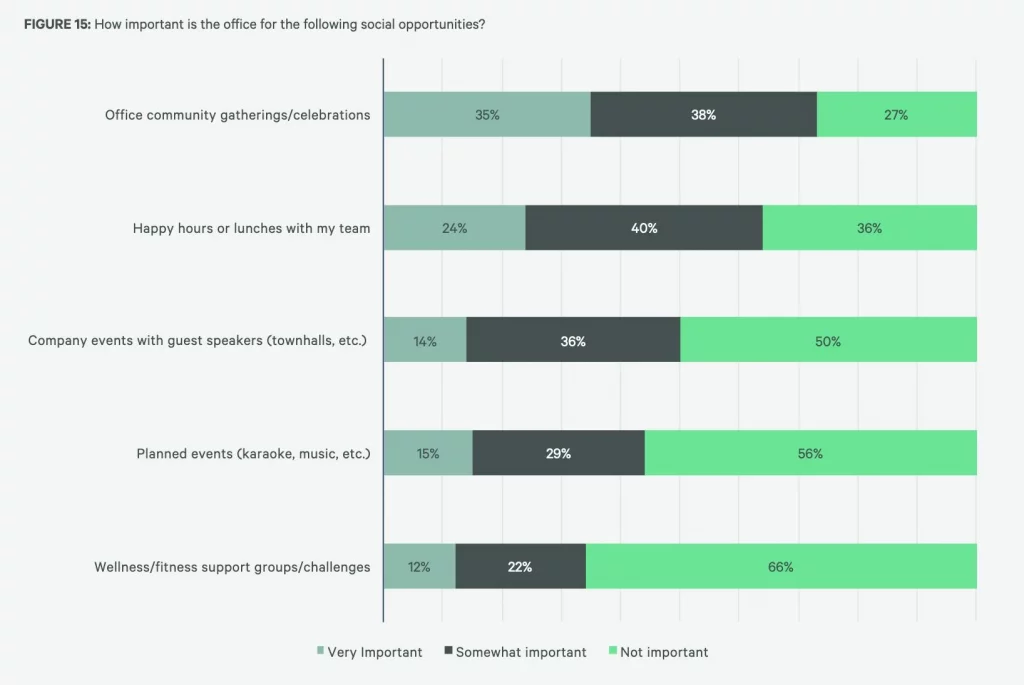
What events, activities, meetings, and other reasons do you find bring your teams into the office?
Reply and let me know what works best for you and your team.
🗣️ Coming Soon: A Way to Boost Your Relationship with Your Boss
We talked about it last week, and it looks like quite a few of you really want to improve how you manage up to your manager.
It's a a great way to secure your career both financially and in potential advancement. It also ensures that you can get what you need for your team.
Best of all, very soon you will have your chance to take this program to help you.
Get your budget approved and your plan ready, because for a very limited time, we're going to re-open this special program.
How it works:
- For the week of April 28th through May 4th ONLY the Mastering Managing Up program will be available.
- Your program will start the week after, on Thursday, May 9th, with a new lesson every Thursday for 10 weeks.
- You'll be able to purchase for individuals or groups, so tell your friends now.
The Price: $135 for the Solo Edition, $175 for the Group Edition.
Unsure how Lighthouse Lessons works? You can read answers to Frequent Questions (FAQs) here.
Not the best timing for you? Remember that for groups of 10 or more managers you can 1) Pick your program and 2) Choose the best start time for you.
If that's you, sign up here and we can talk about the best timing and help pick the perfect program for you.
PS: If a friend sent this to you, sign up here to get this newsletter every Saturday morning: https://getlighthouse.ck.page/9aa103e62f
Sign up to get this newsletter & our latest blog posts straight to your inbox:




